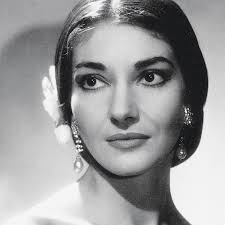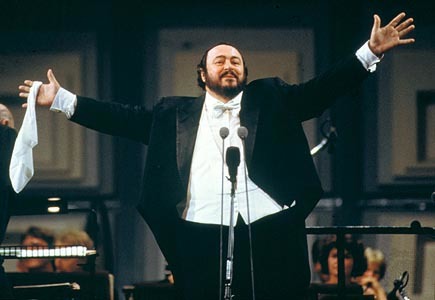
Deborah Voigt © www.1up.com
Picture in your head an image of an opera singer. Like many people, you may see the stereotype of a fat lady in an extravagant gown belting it out like there was no tomorrow. Why are opera singers fat? Or, to be more accurate, why is there such a stereotype about opera singers?
The myth about fat opera singers does have some ground in history. In the past, opera consisted of mainly small-scale productions. By the 1800s, composers and opera houses opted for grander, bigger and fancier work, and that included singers who were capable of really belting it out. The theory went that the larger the singer, the greater the lung capacity to ensure a show-stopping performance. Remember, we are talking about a time long before the invention of sound systems and fancy acoustics.
Another myth holds that having a large amount of fatty tissue around the larynx increases resonance capability to produce a pleasing sound. Yet, it is virtually impossible to have a great deal of fatty tissue around the voice box without carrying a great deal of fatty tissue elsewhere on the body. While there doesn’t appear to be any scientific evidence to support any of these theories, a study published in 2001 in the Journal of voice suggested that professional opera singers tend to develop larger rib cages, and hence might look bigger than they really are.
Mezzo-soprano Marilyn Horne once said, “Ours is a very lonely profession. Eating is company.” The more successful and popular you become, the further away from home you go, and of course, the more times you end up sleeping alone in a foreign hotel room. Busy rehearsal schedules and tours can get in the way of maintaining a regular schedule consisting of eating and exercising well.
Irregular eating habits may also explain obesity amongst opera singers. Many performers often wait until the evening performance is over before they care to take dinner. The reason is that the feeling of fullness can affect breathing, makes one sleepy, or could even lead to gastric discomfort. Hence, many singers will choose to postpone dinner in order to ensure top form. Moreover, flamboyant celebrations packed with hard-to-resist food, food and more food often follows a successful performance. If you take in the calories and don’t burn it, you will most probably put on weight.

Maria Callas
As controversial as it may sound, most singers actually want to drop the pounds and the “big lady” image that comes with being an opera singer. They try many methods to lose weight—crash diets, diet pills, liquid fasts and so on. However, many are also afraid that losing weight too fast will affect their voices, as it has been known that opera singers who lose a significant amount of weight lose vocal luster as well. Maria Callas’ voice began to deteriorate in the 50s, and many thought it was because she had lost over 30 kilograms. Her voice lost its unique touch, and it was barely enough for her to hold a high pitch.
On the other hand, leading dramatic soprano singer Deborah Voigt made international news when she was sacked from Strauss’ “Ariadne auf Naxos” at Covent Garden in London, because the director found her too big to look right in a black dress that was crucial to his staging concept. The unflattering American catch phrase about opera that “It ain’t over ’til the fat lady sings” was headlined as “The show ain’t over till the fat lady slims” in the British tabloid press. As a result, Ms Voigt, who had been struggling with her weight since adolescence, decided to undergo gastric bypass surgery—one of the most drastic measures to combat obesity.
Richard Strauss: Ariadne auf Naxos, Op. 60, TrV 228a – The Prologue: Overture – The Opera: Es gibt ein Reich, wo alles rein ist (Deborah Voigt, soprano; Bavarian Radio Symphony Orchestra; Richard Armstrong, cond.)

Luciano Pavarotti © www.onlineweblibrary.com
Pavarotti also tried to lose weight. However he never truly succeeded. In fact, his former wife used to joke that as long as she could still cook delicious noodles, she didn’t have to worry that Pavarotti’s heart would go astray. Yet in the end, he divorced his wife as well as left us early. Obesity causes diabetes, heart disease, stroke and arthritis. The spinal cord and knees can also deteriorate because of the extra body weight. More importantly, obesity can cause bodily infections that speed up oxidation rates. Through this mechanism, the risk of intestinal cancer, breast cancer, pancreatic cancer and prostate cancers also increase. Research results show that 20% of female and 14% of male deaths in America are due to Obesity. Smoking also increases the risk of pancreatic cancer two-folds. Though Pavarotti admitted that he occasionally smoked cigars, he would only smoke about 10 cigars in the three summer months. Therefore, obesity is probably his cause of pancreatic cancer.
Giacomo Puccini: La bohème, Act I: Che gelida manina! (Luciano Pavarotti, tenor; Orchestra Sinfonica dell’Emilia Romagna; Emerson Buckley, cond.)
Despite all the medical battles, however, Pavarotti once said, “I think a life for music is a well-spent one, and that’s what I have dedicated mine to.” Perhaps this is how we should remember him—as a musician who devoted his life and work to music.
References: When the Fat Lady Sings, Patterns of breath support in projection of the singing voice, With Surgery, Soprano Sheds a Brünnhilde Body
For more of the best in classical music, sign up to our E-Newsletter





One famous tenor died at age 38 while undergoing a weight-loss program: Mario Lanza ” On September 25, 1959, he entered Rome’s Valle Giulia clinic for the purpose of losing weight for an upcoming film. While in the clinic, he underwent a controversial weight loss program colloquially known as “the twilight sleep treatment,” which required its patients to be kept immobile and sedated for prolonged periods. On October 7, a day before his scheduled discharge, he died suddenly at the age of 38.” from wikipedia
The image of opera singers as fat is completely spurious. Essentially, on the bellies of a few famous singers of generous girth an entire stigma has been built that has fueled the skepticism of opera – in contemporary society that is preoccupied with beauty, the idea of musical-play filled overweight people does not sit well with younger audiences. I am not judging one way or another about being overweight (certainly I need to lose some), but I am say that this create an image problem in the societies we live and that this MYTH, and it is a myth, is extremely detrimental to longevity of the art-form.
To support my point today, I could certainly point you to hundred singers that prove the rule is sleek and vivacious not round and rubenesque, though I believe there is some truth to the idea that many singers do tend to have a larger rib-cage for obvious reasons, or at the very least ‘inflate’ for the function of singing. For contemporary opera-models, see Dimitri Hvorostovsky (particularly his shirtless music video), Nathan Gunn (both of those entries can be found on the aptly named ‘Barihunks’ website along with many others) angela gheorghiu, nicole cabell, denyce graves, Kate Aldrich, Joans Kaufman, and thousand others (these were chosen for no particular reason).
To those who say this is contemporary phenomenon and that singers used to be fat, I say not so. Franco Corelli, the powerhouse Italian tenor known for his immense voice, was equally known for his movie star looks and athletic physique (see google search); George London too was known for his slender frame and he was certainly one of the most powerful Wagnerian Baritones that ever lived; likewise Lawrence Tibbet can be seen on film shirtless; see also Titto Ruffo, Roberta Peters, Reri Grist, the Wagnerian James King, Zinka Milanov, etc. for yesteryear examples. In truth the phenomenon of beauty obsession is also not as new as we would like to to think, and me of these stars were also known for looks as much as their beautiful voices in their own time. In fact, in the late 19th century several operas were written, including a few by Massenet, almost on the basis of get a young, beautiful soprano in a rather scantily clad costume. And let us not forget about Strauss’ Salome and the Dance of the Seven Veils.
In short, some opera singers are fat, some are in between, some are skinny, some are tall and some are short. Some bankers are fat and some are skinny, some bus driver are tall and some are short, etc. Opera singer are not any more or less overweight than any other profession, and, in fact, are probably more likely to be skinny as a result of being image conscious. As for those, like Callas, who once were larger an lose much weight to the detriment of their voice – 1. it is difficult to prove that the voice deteriorated (which is also a mater of opinion) do to weight loss and not the simple aging that results from singing opera particularly heavy repertoire – 2. the voice was not good because of the weight, rather the singer was accustomed to one session of a physical exertion with 20 to 40 to, in extreme cases, 100 more pounds that they suddenly no longer had; i.e. that did know how to sing in their new body or relearn how to sing as a skinnier person. One well-known voice teach once told me that it was possible that the extra torque that was generated simple the weight of the body fat around the torso had to be replaced with more fine muscular action once the weight was lost, and that those singers who suffered simply didn’t know how to do that – possible.
Sorry for going on at length, but I think these kinds of myths hurt opera. And again, we call make our own decisions and opinions about weight, but spurious truths/myths don’t help anyone.